There’s a saying that sport and politics don’t mix – usually in an attempt to wave away some inconvenient moral issue.
Today though, in my latest missive on British culture:
I’ll be demonstrating that it’s sport and music that don’t mix.
Specifically football (y’know; soccer).
It would have made sense to tie this in with the recent World Cup (there’s those moral issues) but I just wasn’t that forward thinking.
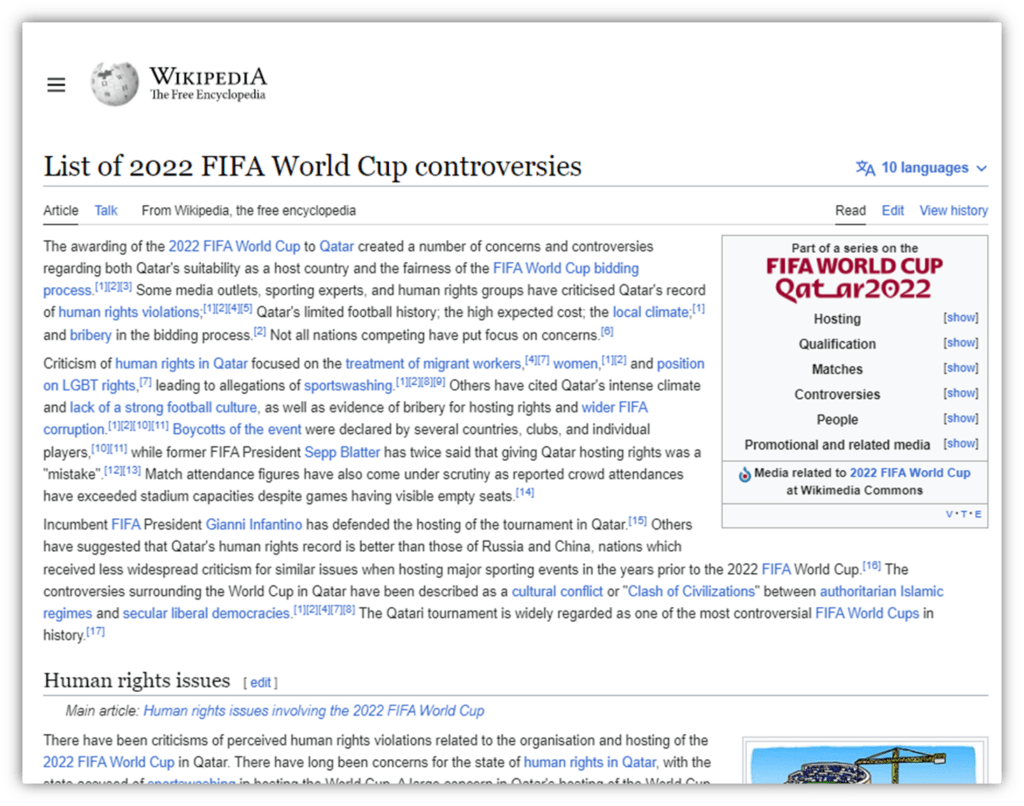
Wikipedia’s got your back.
The England 1970 World Cup squad are to blame.
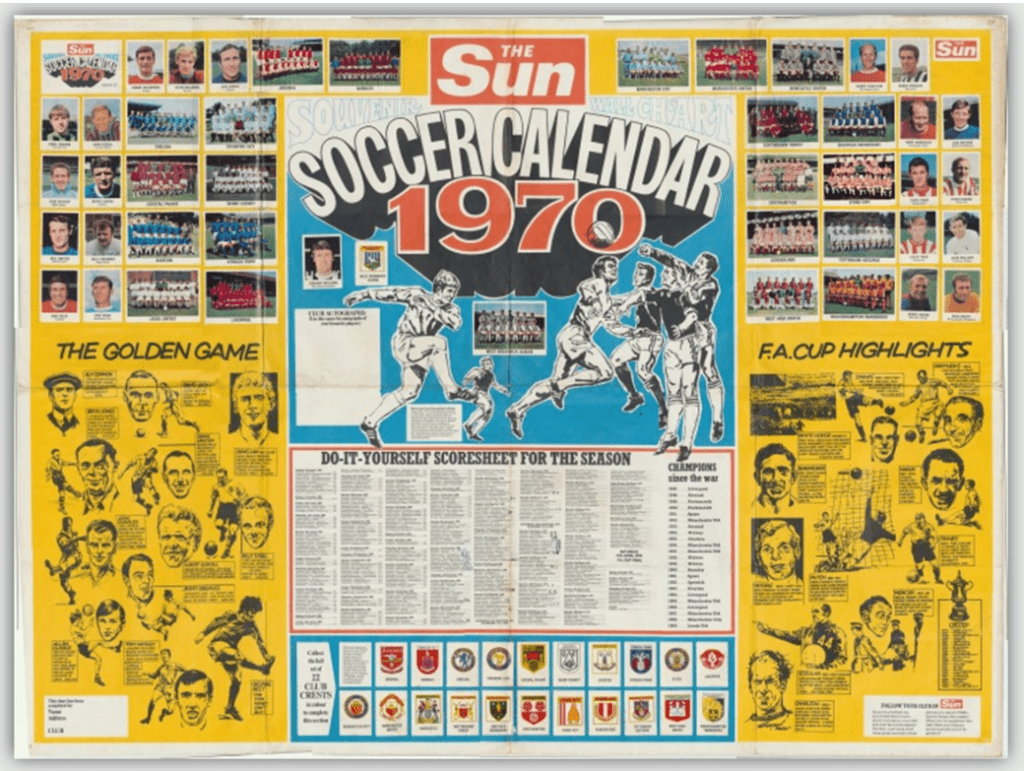
There were football songs before.
But it was 1970 when the charts were stormed, ushering in 30 years of crimes against music.
England were reigning champions. Optimism abounded that this team was even better than the ’66 victors. As usual, expectation and reality didn’t quite meet in the middle.
The squad recorded a whole album, winningly titled The World Beaters Sing The World Beaters.
Its not terrible, its just wholly unnecessary.
But if you want to hear a load of footballers singing the hits of the 60s such as Sugar Sugar and Ob-La-Di, Ob-La-Da, dive right in. Its available on streaming services.
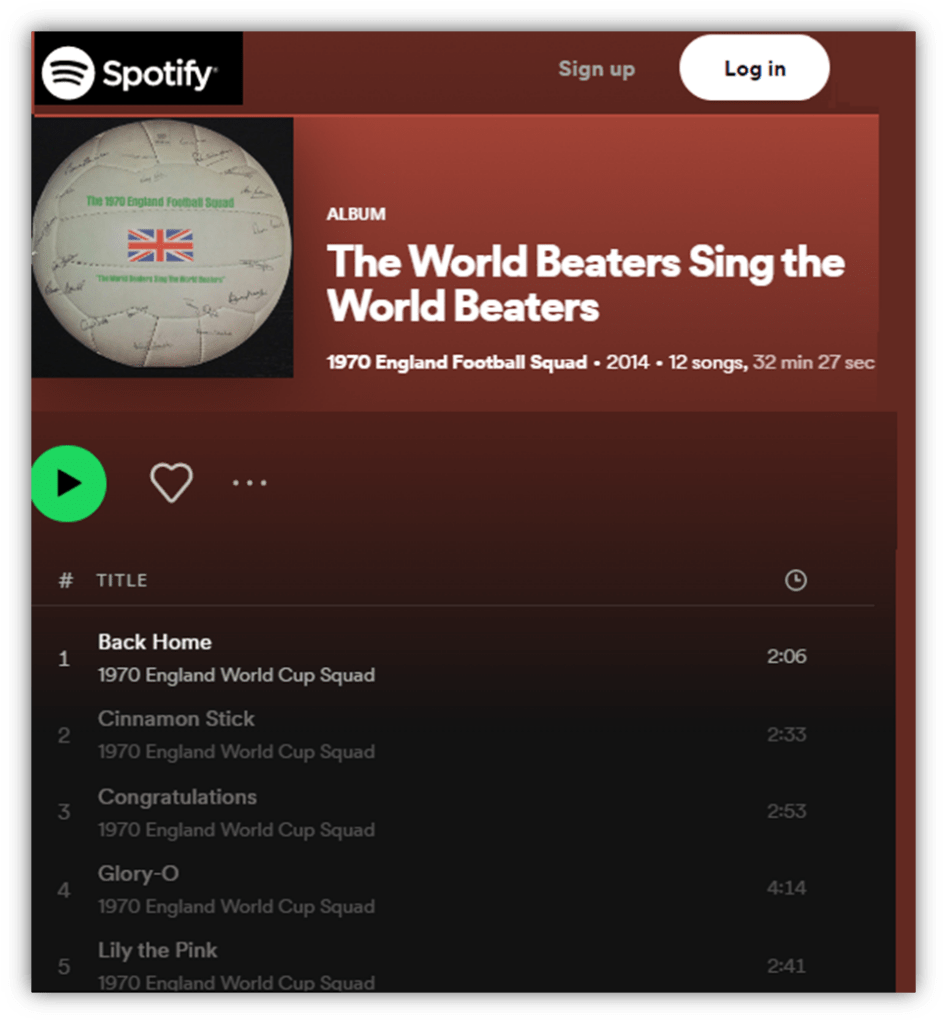
We’re IN!
The one original composition was jaunty #1 single Back Home. It was written by Bill Martin and Phil Coulter who were (whisper it) Scottish and Northern Irish. A job’s a job, right?
In its favour, it clocks in at only two minutes, and there’s none of the boastful triumphalism that would become a motif. Its quite sweet in its modesty that; “Back home though they think we’re the greatest, That’s what we’ve got to prove.”
And don’t they look smart in their dinner suits?
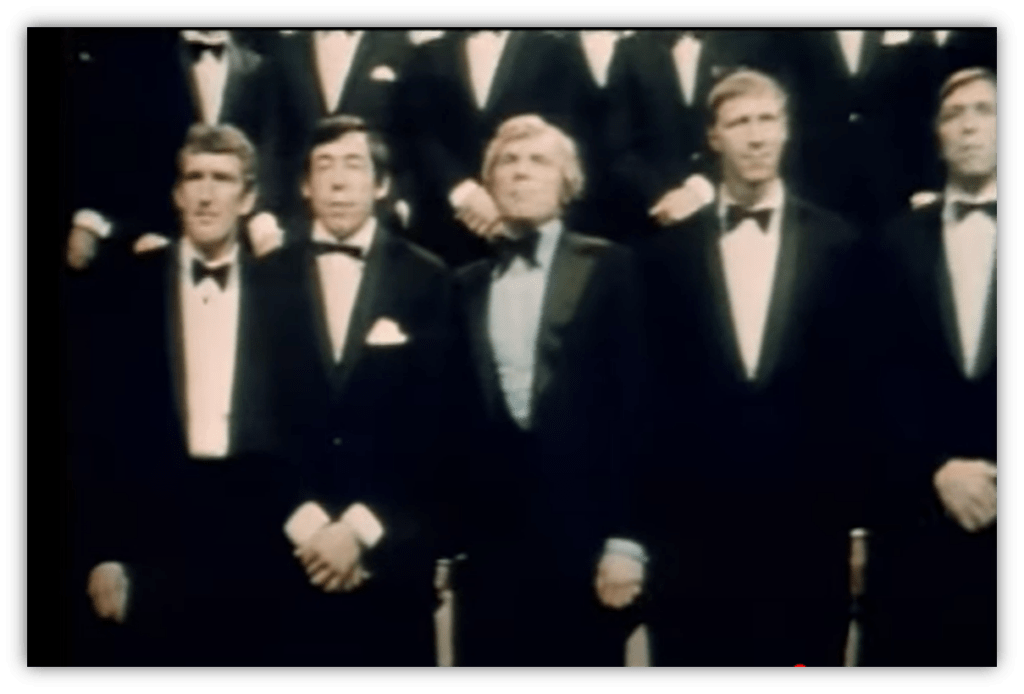
England failed to qualify for the next two World Cups. But things went better north of the border.
And Scotland got on board.
Their 1974 effort (#20 hit) was also written by Martin & Coulter. But rather than the processional march they gave England, this one has a glam rock vibe that’s actually… not bad.
Though maybe Bill Martin got carried away as a Scot into giving it the title Easy Easy. Outcome = first round exit.

Come 1978 and Rod Stewart was on the scene. The song does suggest a bit of geographical dislocation, as although the tournament was in Spanish speaking Argentina, it’s called Ole Ola (Muhler Brasileira). Which basically translates from Portuguese as, ‘Hello hello Brazilian women’ and has a samba rhythym. Rod perhaps getting distracted by another of his favourite things; the opposite sex. Lack of accuracy didn’t prevent it getting to #4.

In 1982, England were back to go head to head with Scotland on the charts. England went for the standard squad singalong promising that; This Time (We’ll Get It Right). Outcome = what do you think?! The single fared better than the team reaching #2.

Scotland went off in a whole new fever dream of a direction. We Have A Dream was written by BA Robertson, who would later turn up in Tom Breihan’s Number Ones as co-writer of The Living Years.
Maybe he got the choir idea from this. He went over the top and carried on ascending. Front and center was actor John Gordon Sinclair giving a stirring monologue as an ordinary guy, living out a fan’s’s dream of being called into the squad for the World Cup.
While behind him, the Scotland team intone that they have a dream. It all builds to a bagpipe strewn crescendo and is infinitely better than the England effort – but peaked behind it at #5.

We’ll mostly ignore 1986. Just as the record buying public did.
England’s We’ve Got The Whole World At Our Feet limped to #66, while Scotland’s Big Trip To Mexico did even worse at #81, both sounding years behind the times. The most notable aspect is that both were written by Tony Hiller, a man prolific in the world of the football anthem.
Tony made it big as the man behind Brotherhood of Man then carved out a sideline writing singles for Arsenal, Everton, Manchester United, Liverpool amongst others. I can only hope they paid him well.
Then again, having heard them all maybe he was paid too much.
In 1988 England released All The Way for the European Championships. Finally getting with the times, they gave responsibility to the all conquering Stock-Aitken-Waterman production team.
It’s exactly what you’d expect of a SAW single, only with a bunch of blokes singing rather than Kylie. It performed as badly as the team did (three games = three defeats.)
Charting at #64, but leaving this classic of the genre: the uncomfortable chat show performance.
With half the squad multi-tasking with a workout while they mime along.

In 1990 England finally did get it right (although, not quite on the pitch: unlucky semi final defeat on penalties) as New Order were brought on board apparently due to the English Football Association press officer being a fan and despite the band not being particularly interested in football.
The single was based on the theme tune to current affairs show Reportage, that Gillian and Stephen had previously recorded in their The Other Two guise. Comedian/actor (and dad to Lily Allen) Keith Allen wrote the lyrics – and 20 years after their last chart topper, England were back at #1.

Or ENGLANDneworder as it was credited to:
England getting top billing, despite New Order putting most of the work in.
Put off by the shame of that chat show performance in ’88, only six of the squad turned up to record backing vocals and for John Barnes to provide a star turn with a rap.
The positive reviews of his rap more down to amazement that a footballer was able to string sentences together in a coherent manner, rather than Barnes being a Chuck D in the making.
One lost opportunity with the single is that it came out at a time when club culture and Ecstacy were really taking off.
Keith Allen suggested it be called ‘E For England’ with lyrics “E is for England, England starts with E / We’ll all be smiling when we’re in Italy”.
Unsurprisingly, the corporate suits didn’t go for it.

Scotland, meanwhile, went for a turgid rock song, Say It With Pride, featuring the all star talents of Fish (ex of Marillion) and members of Runrig, Love and Money, The Silencers and Deacon Blue. It couldn’t compete with the positive vibes of England landing at #45.

And that was it for the national teams.
England went out on a high. The next time a tournament anthem was produced was Three Lions in 1996, when the vocal talents of footballers were deemed surplus to requirements never to be called on again.
Scotland went the same way. In 1996 a version of traditional folk song Purple Heather was credited to ‘Rod Stewart With The Scotland Euro 96 Squad.’ But despite a video including clips of the squad in the studio, it appears to feature no vocal contribution from them.
Over to the club sides, then:
In the wake of Back Home, a tradition took hold to release singles to mark reaching the FA Cup Final.
Arsenal started us off at #16 in 1971 with Good Old Arsenal featuring a jaunty swinging sixties vibe.

Chelsea and Leeds United stepped it up the following year both reaching the top 10. The Chelsea effort is titled Blue Is The Colour but the video of the recording session suggests 50 shades of brown might be more appropriate.

The chart career of one club in particular is something that plenty bands would be envious of. Manchester United scored seven top 40 hits, four of which made the top 10.
And in 1994: became the only club to reach #1 with Come On You Reds. It was masterminded by Status Quo, lifting the music from their own Burning Bridges single and altering the lyrics to the usual aggrandisement and reeling off of various players.

Unlike most bands, football teams don’t adhere to one genre.
Manchester United have veered from:
- Traditional marching songs that are easy for a group of blokes
- A whole stadium to sing along to
- The rap/rock of We’re Gonna Do It Again in 1995
- The 2 Unlimited Euro-techno of 1996s Move Move Move.
Proving that they were ever adept at being slightly behind the times, their chart career ended in 1999 with Lift It High (All About Belief). Written by Ade Orange, keyboard player for Gary Numan. And whether it was intentional trolling or not, it did a great job of ripping off Oasis.
Who are very firmly in the camp of arch rivals Manchester City.

Some teams adopted the tactic of bringing in a ringer, in the shape of an actual musician to attempt a bit of professionalism. Not all of them in the prime of their careers.
In the late 70s, US #1 alumni Paper Lace had their final top 40 hit alongside the Europe conquering Nottingham Forest with We’ve Got The Whole World In Our Hands.

Another popular football song trope there, taking an already well known song and adapting it to your needs.
There’s also Glory Glory Man United (#13 in 1983) which borrows the tune of The Battle Hymn of the Republic.
And Everton’s Here We Go (#14 in 1985) which is based on The Stars and Stripes Forever.
In 1997, Chelsea enlisted Suggs, lead singer of Madness to head up Blue Day, scoring a #22 hit. It owes a big debt to Britpop; its got strings, its a bit Beatles, there’s some Madness styled piano. Its almost passable as a song in its own right due to the footballers being relegated to backing vocals and rousing shouts of “Chelsea, Chelsea.”

Tottenham Hotspur had a long association with Chas & Dave, who are worthy of an article to themselves for their contribution to British culture in the form of cockney pub rock. They wrote and performed four FA Cup singles for Spurs between 1981 and ’91.
The first; Ossie’s Dream (Spurs Are On Their Way to Wembley) is the most iconic and the biggest hit at #5. Ossie is Osvaldo Ardiles, their Argentinian midfielder, whose knees, as the lyrics tell us, ‘have gone all trembly’ at the prospect of going to Wembley.
Ossie gets a starring role, his mangling of the line ‘In the cup for Tottenham’ as Tottingham endeared him further to fans.

Lastly, this is either the pinnacle or nadir of the football song, depending on your outlook.
Liverpool were the dominant force in English football through the 70s and 80s but this didn’t translate to chart success. They had just one top 40 hit to their name, with a retro glam rock take on The Rubettes I Can Do It in 1977, retooling it as We Can Do It.

In 1988 they put that right with The Anfield Rap (Red Machine In Full Effect) getting to #3. It has the ultimate novelty value of being written by a footballer; Liverpool’s Australian midfielder Craig Johnston. It samples LL Cool J’s Rock The Bells with John Barnes (him again) intoning that Liverpool FC is hard as hell, the drums from Funkadelic’s You’ll Like It Too and The Beatles Twist And Shout.
It has lyrics referencing the economic North / South divide and adroitly gives the middle finger to the racist abuse of Barnes, who earlier that year had a banana thrown at him during a game; “When I do my thing, the crowd go bananas”.
Despite all that it is quite remarkably bad. It’s like listening to an alien race learning how to talk, and really has to be experienced with the video for the full horror. As the old joke goes, its rap with a capital C.
As we entered the new millennium the tradition petered out.
The FA Cup became less important, and the same few teams were dominating, lessening the appetite for them to keep churning out songs every year. Clubs and players became more PR savvy, the amateurish nature of a lot of the songs didn’t really fit with the image they wanted to portray.
I’ve listened to a whole lot of these in writing this, many more than I’ve linked too. While they are almost all varying degrees of bad ,they generally share the same qualities of:
- Keep it basic
- Keep it lively
- Tell us how great you are
Just what is needed for a crowd to sing. Or in the case of the Anfield Rap: ignore all that, but make it so bad it’ll stay with you forever.
If this has whet your appetite this website has over a thousand examples from all over the world; https://45football.com/
I’m guessing that there must be similar examples of sports teams crossing over into music in the US but the only one that I’ve heard of is the Chicago Bears: Super Bowl Shuffle.
Any favourites you’d like to share?
Let the author know that you liked their post with a “heart” upvote!


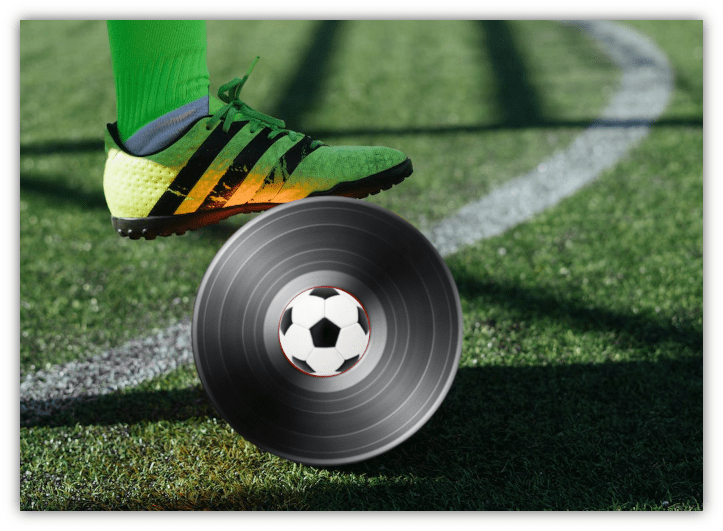
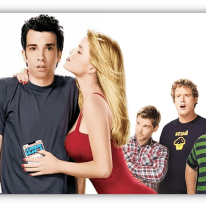
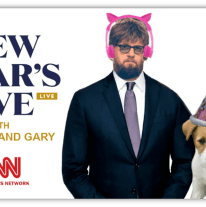
There’s a full list here of every football song to make the charts – all 60 of them, showing just how much a tradition it became. Also includes the short list of individual footballers who had chart hits which provides further evidence of crimes against music should you want to delve deeper.
https://en.m.wikipedia.org/wiki/List_of_UK_hit_singles_by_footballers
Hilarious stuff, JJ.
And you have me wondering: I wonder if the Chicago Bears effort was just a silly idea, or was the result of someone looking at the UK charts and thinking, “we might have something here.“
Genuinely curious; does anybody know?
FLAG ON THE PLAY!
You can’t bring up the “Super Bowl Shuffle” without including the video!!
https://youtu.be/8O6GCHz7lMA
I wondered the same thing but a quick Googling shows several variations of the story so I can’t tell which version is true. All the stories have in common is producer Richard E Meyer and wide receiver Willie Gault, but who approached who is unclear, and there’s no mention of football (soccer) songs being an influence. It does seem accurate that Gault brought the idea to the rest of the team.
The Wikipedia entry for the Superbowl Shuffle lists dozens of similar songs by or about other NFL teams, but I don’t remember any of them.
It’s so funny how weird the charts are in England. I always assume that the smaller population base allows for more chart volatility and more flash-in-the-pan novelties. It certainly makes the US Hot 100 look much more…stable? And sometimes boring.
Similarly with the 1970 England album, I couldn’t find anything that explained who and why they came up with the idea in the first place. Obviously it worked pretty well commercially – the album got to #5 on the charts. Sometimes you just need maverick risk takers to give it a go, its a crazy idea but it might just work!
As an Everton fan (UGH), I am not supposed to like anything associated with Liverpool (although the rivalry isn’t as heated as other ones – I’m looking at you Tottenham/Arsenal and Man City/Man U), I can not help but get chills when I hear this song:
https://youtu.be/t3J_2R9rAp8
Fun fact with which to wind up Liverpool fans is that some older Man Utd fans claim that they sang You’ll Never Walk Alone before Liverpool adopted it. Whether that’s true or not I have no idea. There’s no love lost between them so they just be trolling Liverpool.
When I read the start of your comment I thought you were going to profess your admiration for the Anfield Rap. That may be a step too far for anyone that doesn’t support Liverpool.
Do you think that the U.S. might produce more of this kind of song if there was actual international competition in one of our more popular sports? There are so many teams in every sport here, and fan bases are so localized, it would be hard to make anything more than a regional hit. We don’t really have national teams in any sport except soccer (sorry, JJ, I mean football), which isn’t nearly as popular here as in the rest of the world. Maybe someone missed a chance back when the basketball Dream Team competed in the Olympics.
An inspired idea that I’d never had considered.
The trick there would have been to figure how to come off patriotic without being jingoistic in the eyes of the world. The US basketball team, loaded up with professionals, was so overwhelmingly superior that a celebratory recording might have been seen as piling on.
Of course, if they had wanted some anthemic theme song, the solution to the problem is an easy one: Make it a charity record.
Americans are not always great at patriotism without jingoism. But you are right, anything is all right and will sell as long as it’s recorded for charity.
I wondered if Shaq was part of the Dream Team but turns out he was the ’96 vintage. I knew he’d had a recording career as I remember him making the British charts despite basketball not being huge here. Just looked at his discography and had no idea how extensive his recording career was. I thought it was a one off album taking advantage of his star status.
Is he the biggest sports / music crossover?
So I had to do a bit of research on this one. Apparently Mike Reid, who played football for the Cincinnati Bengals in the 70’s, is in the Nashville Songwriters Hall of Fame. He has written songs for many country music performers. So, while he was never really successful as an artist, despite playing piano in the symphony orchestras of a few different cities, we would have to consider him a success in music. Not sure how to compare him to Shaq’s success, but I think he has an interesting story.
Quite the renaissance man. Professional sports career, hall of fame songwriter and symphony pianist. Makes the rest of us look bad that can only manage career.
Ron Artest, who would later change his name to Metta World Peace, as a member of the Indiana Pacers, told his head coach that he was going to take some time off to concentrate on his second career as a rapper, in the middle of the season, I believe.
Clearly, the problem with sports mixing with music isn’t the mix per se…it’s the sports! 🤓
As I gathered the topic of your column, I immediately thought of “World in Motion” as possibly being relevant, and it’s the only song here I know!
(It’s also one of my least favorite New Order songs! Good to hear that they don’t care for sports either 🤓 )
In another universe Sham 69 were Manchester boys, and they united the kids with some raucous sports chants.
Oh, and can you kick it? Yes you can!
https://www.youtube.com/watch?v=O3pyCGnZzYA
Sham 69 might not have ultimately United the kids but they do have footballing connections. For the 2006 World Cup they re-recorded Hurry Up Harry as Hurry Up England and got themselves a #10 hit. 27 years after their last one.
And then there is the story of how they got their name which is from some faded grafitti celebrating the achievement of Waltham & Hersham Football Club in winning the Athenian league in 1969. Waltham & Hersham 69 having faded so only the sham 69 was visible.
Just in case you’re wondering where Athens comes into this; for some reason a number of minor leagues in the south of England adopted an ancient Greek theme. As well as Athenian there were Isthmian, Corinthian and Delphian football leagues.
Other than The Super Bowl Shuffle, I had a hard time remembering any other US sports team recording.
So here’s a first-adjacent thingy. And, yes: “What were we thinking back then?” is indeed a vaild response.
https://www.youtube.com/watch?v=Ue_mMXeDjg4
This was HUGE during the 1982-83 Sixers season (basketball, JJ). Never hurts to have Zinkoff’s reading of the starting lineup to kick off a song.
https://youtu.be/S47bb6RCLhs
I spotted Classie Freddie Blassie in the first verse and it reminded me of his “hit” single. As if we couldn’t stray any farther from the original topic.
https://youtu.be/McLw5Tg5GOc
I have to say, reading this has made me rather grateful Americans have no desire to hear new original music from/relating to their sports teams. What a lengthy list you Brits have!
Nah, we are all about each team finding an existing song to hitch a buggy to and hoping it catches on. Some make perfect sense (Cincinnati Bengals playing Welcome to the Jungle), others make no sense but people still love, and then there’s teams like the Steelers who insist on playing Styx’ Renegade to pump the crowd up and it results in aggravating me to no end….
I think teams do various songs for local charities, but nothing ever goes beyond the immediate market. The one that comes to mind are the Eagles big guys up front-linemen doing a Christmas album.
https://www.google.com/amp/s/www.inquirer.com/news/philadelphia/eagles-christmas-album-jason-kelce-lane-johnson-20221220.html%3foutputType=amp
The Steelers have also adopted a song from Wiz Khalifa that’ll appear in Tom’s column. That might be the closest thing the US has to a sports #1…
Does WWF wrestling count?
https://youtu.be/qcKATAMJ4Fs
Anfield Rap is going to be my contribution to Earworm Wednesday. Damn you JJ!